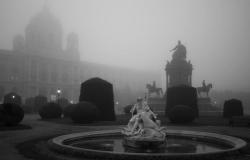Victory Day, Propaganda Day

Robert Schuett calls out attempts by the Kremlin to instrumentalize the history and memory of World War II to justify the slaughter of Ukraine.
I live and work just a short walk from the Soviet War Memorial in Vienna, and it’s a place I know rather well. It sits tucked between the stately curve of Prinz-Eugen-Straße and the monumental French embassy on one side, and the beginning of the historic Rennweg on the other—the street that runs past the Belvedere Palace and, according to legend, prompted 19th century statesman Prince Metternich to remark that the Balkans begin.
Behind it rises the grand Palais Schwarzenberg. In front stretches the broad expanse of Schwarzenbergplatz, anchored by the Hochstrahlbrunnen fountain. Like many other Viennese and those who live nearby, I’ve spent countless evenings there, especially in spring and summer, with my young son. Families gather, children dash barefoot through the cooling mist, and as the evening sun catches the spray, rainbows briefly shimmer across the square. It’s a place full of life, joy, and quiet beauty.
But at the heart of it all stands the Russendenkmal—the Russian Monument, as it’s popularly called—and that presence makes the place, unavoidably, one of history and memory. Unveiled in August 1945, it commemorates the roughly 17,000 Soviet soldiers who died during the Battle of Vienna, when the Red Army drove Nazi forces from the city that very April. The memorial features a heroic statue of a Red Army soldier holding a flag, backed by a colonnade and crowned with a golden-plated Soviet emblem. As it proclaims in Russian: “Eternal glory to the heroes of the Red Army, who fell in battle with the German fascist invaders for the freedom and independence of the peoples of Europe.”
Now, even if one were to turn a blind eye to the substantial historical and scholarly evidence that Soviet forces committed war crimes—including mass rape, looting, and violence against civilians—during their occupation of parts of Austria from 1945 to 1955, particularly in the months following the Red Army’s capture of Vienna in April 1945, it is one thing to pose as liberators and sustain that narrative in the context of postwar Austria. It is quite another to exploit the 80th anniversary of the Allied victory over Hitler and Nazism as propaganda for present-day Russia’s so-called “special military operation” against Ukraine—orchestrated by President Vladimir Putin.
Ukraine was one of the main battlegrounds of World War II, and its people paid an extraordinary price. The war front tore through Ukrainian territory twice — first from west to east, then from east to west — leaving entire cities in ruins and communities devastated. Approximately eight million Ukrainians died during the war, including five million civilians. Millions more were displaced, starved, or imprisoned. Ukrainians fought not only in the Red Army, where some six million served, but also in resistance movements and allied armies across Europe. Nearly every Ukrainian town, village, and family carries the scars of that war.
To accuse Ukraine today of being a “Nazi country” is not just historically false; it is a grotesque insult to the memory of those who resisted fascism and suffered under both Nazi and Soviet rule. This narrative, promoted by the Kremlin, distorts history for political ends and denies Ukraine its rightful place among those who helped defeat Hitler. The fact that the notion of the “Great Victory” has, under Putin, been transformed into a collective cult does not make it any more justifiable—neither historically, nor in the present.
One would think that great liberators would not wage unprovoked wars of aggression—and yet that’s there for the whole world to see. Since Russia launched its full-scale war in 2022, Ukrainians have endured unimaginable suffering. Entire cities have been shelled into ruins. Thousands of civilians have been killed, many more wounded, and millions forced from their homes. Mass graves, torture chambers, and evidence of war crimes have been uncovered. Hospitals, schools, power stations, even maternity wards, have been deliberately targeted.
Children have been abducted and deported to Russia. The toll of war on Ukraine’s children is devastating; not only in lives lost, but in futures stolen. Since 2022, over 2,500 children have been killed or injured, with casualties rising sharply in 2024. One in five children has lost a close relative or friend. Homes, hospitals, and schools have come under fire; classrooms have moved to basements and bunkers. More than 3,000 educational facilities have been damaged or destroyed—losses that are not only physical, but psychological and deeply human.
This is not a war of military necessity, but one of annihilation, aimed at erasing Ukraine’s sovereignty, identity, and future. And yet, against this horror, Russia continues to wrap itself in the language of liberation and anti-fascism, as if its own actions were not the clearest betrayal of everything it claims to commemorate.
History is messy, and the politics that shape it are even messier. That’s almost a truism, or at least it should be. But what is certainly not trivial is that Putin’s Russia has no historical, legal, political, or moral standing to claim any exclusive rights over the victory against Hitler and Nazism. Even more unacceptable and, indeed, morally abhorrent are any attempts by the Kremlin, its allies, or international bystanders to instrumentalize, even in the smallest and most indirect of ways, Victory Day or the history and memory of World War II, to justify the slaughter of Ukraine and the murder of Ukrainians.
Once again, on May 8th, many inside Russia and around the world were drawn to the Kremlin’s display of grandeur and the spectacle of the Moscow military parade on Red Square—Which is, frankly, as sad as it is tragic. Whenever I dash past the Russendenkmal, which is nearly every day, I’m reminded that monuments must live in the truth of war, not be twisted into tools for war.
Robert Schuett has over 20 years of experience in academia and government, specialising in national security and foreign affairs. He has a distinguished background in military intelligence analysis, and served in the Office of the President of the Republic of Austria. Before entering government service, he was a postdoctoral visiting scholar at the University of California, San Diego. Robert holds a Ph.D. from the School of Government and International Affairs at Durham University, as well as the venia docendi (full professorial qualification) from the University of Salzburg. He is also a long-standing Honorary Fellow of Durham University, and currently serves as Chairman of the Austrian Political Science Association.
Photo by Simon Berger


